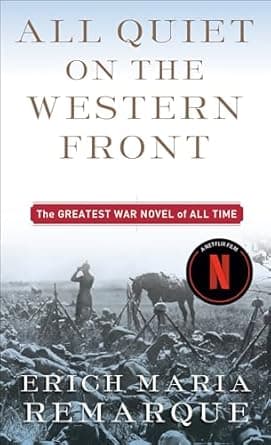
Book Stats
625
Upvotes
45
Downvotes
+580
Net Score
All Quiet on the Western Front
by Erich Maria Remarque
Description
A devastating anti-war novel following German soldiers in WWI, offering one of the most powerful statements against war ever written.
Paul Bäumer is eighteen when he and his classmates are swept up in the patriotic fervor of 1914 and volunteer for the German army. Their teacher had filled their heads with romantic notions of glory and honor, but the reality of trench warfare quickly strips away these illusions. What follows is a brutal education in the realities of modern warfare.
Remarque's unflinching portrayal of the horrors of war—the mud, the rats, the constant threat of death, the psychological devastation—creates one of literature's most powerful anti-war statements. The novel shows how war dehumanizes everyone it touches, turning young men into killers and reducing human beings to mere bodies to be destroyed.
Paul's narrative voice is matter-of-fact and observational, which makes the horror even more effective. He describes terrible events with the detachment of someone who has seen too much, who has had to disconnect emotionally in order to survive. This emotional numbing is itself one of war's casualties—Paul and his comrades lose not only their lives but their capacity for normal human feeling.
The novel's most powerful moments show the arbitrary nature of death in war. Good men die pointlessly while others survive through pure chance. Remarque shows how war makes heroes and cowards, but these distinctions are ultimately meaningless in the face of industrial-scale killing.
The book's treatment of the older generation's responsibility for the war is particularly bitter. The teachers and politicians who sent these young men to die never face the consequences of their rhetoric. Paul realizes that his generation has been betrayed by the adults who should have protected them.
All Quiet on the Western Front was banned and burned by the Nazis, who understood its power to undermine militaristic propaganda. It remains one of the most important war novels ever written, a testament to the human cost of political conflict.